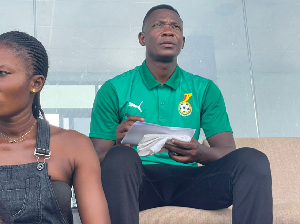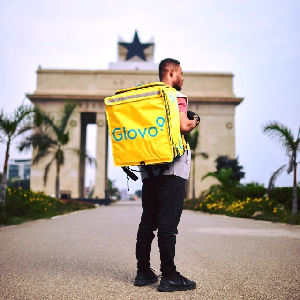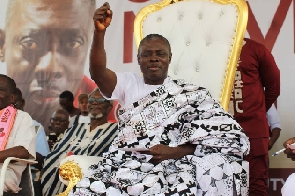- Home - News
- TWI News | TV
- Polls
- Year In Review
- News Archive
- Crime & Punishment
- Politics
- Regional
- Editorial
- Health
- Ghanaians Abroad
- Tabloid
- Africa
- Religion
- Election 2020
- Coronavirus
- News Videos | TV
- Photo Archives
- News Headlines
- Press Release
General News of Tuesday, 15 October 2002
Source: gna
Radioactive workshop under way in Accra
Thirty-four radiation scientists and legal experts from 17 African countries on Monday began a five-day workshop in Accra to develop a legal framework to govern the safety of radioactive waste and safe transport of radioactive materials.
The workshop, the second regional training workshop for the English speaking African region, is being organised by the Legal Affairs Office of the International Atomic Energy Agency (IAEA) in collaboration with the Radiation Protection Institute of the Ghana Atomic Energy Commission (GAEC).
Radiation sources are transported and used throughout the world for a variety of purposes in industry, medicine, teaching and research, agriculture and electricity production.
These sources become waste when no longer in use, and serious accidents have occurred during their use as a result of ineffective control and lapses in management control during extended periods of storage.
The workshop is in response to the need expressed by member states of the IAEA in Africa to establish or strengthen their legal framework for the safe and peaceful uses of nuclear energy.
It seeks to assist target countries in complying with the fundamental requirements of treaties, conventions, protocols and other international relevant instruments.
Opening the workshop, Professor Dominic Fobih, Minister of Environment and Science, said the international community had recently raised alarms on the problems associated with radioactive waste.
He said the lack of control of radiation sources and improper management of the wastes had resulted in widespread contamination in some countries. Professor Emmanuel Owusu-Bennoah, Acting Director General of the Council for Scientific and Industrial Research read Prof Fobih's statement.
He noted that since 1995, at least 60 severe radiological accidents were reported and which were sources not under regulatory control, lost, stolen or abandoned.
These have led to over-exposure of individuals to radiations, some leading to fatalities with serious economic consequences in terms of decontamination, evacuation, resettlement and treatment of the injured.
Prof. Fobih praised the IAEA for evolving a model Project on Radiation and Waste Safety Infrastructure in member states throughout the world and for committing considerable financial resources and technical effort to enable the African member states to establish adequate regulatory framework for radiation and waste safety.
He however, noted that even though much progress had been made in that area, participating member states should intensify efforts to establish and strengthen their legal framework for safe and peaceful application of nuclear energy.
He stressed on manpower training as a means to accomplish appropriate legal framework to manage radioactive waste and to safely transport radioactive materials.
Professor Edmund Osae, Acting Director the GAEC in a welcoming address said about 3000 people, from both Ghana and other countries had been taken care of at Radiation Therapy of the Korle Bu Teaching Hospital since it was established four years ago.
He said this had saved a lot of lives and reduced the high expenses that would be incurred in sending cancer patients abroad for treatment. Mr Wolfram Tonhauser, a Legal Officer of the IAEA in Vienna, said IAEA experts from Belgium and India would be participating in the workshop.
He announced that a third regional training workshop for addressing emergency response and physical protection was expected to be organised for both English and French speaking countries together next year to discuss all aspects of nuclear law.
Professor Daniel Adzei Bekoe, Chairman of GAEC chaired the opening ceremony and asked the participating countries to co-operate with one another in the formulation of regulation to control radioactive waste and transport of radioactive material.










